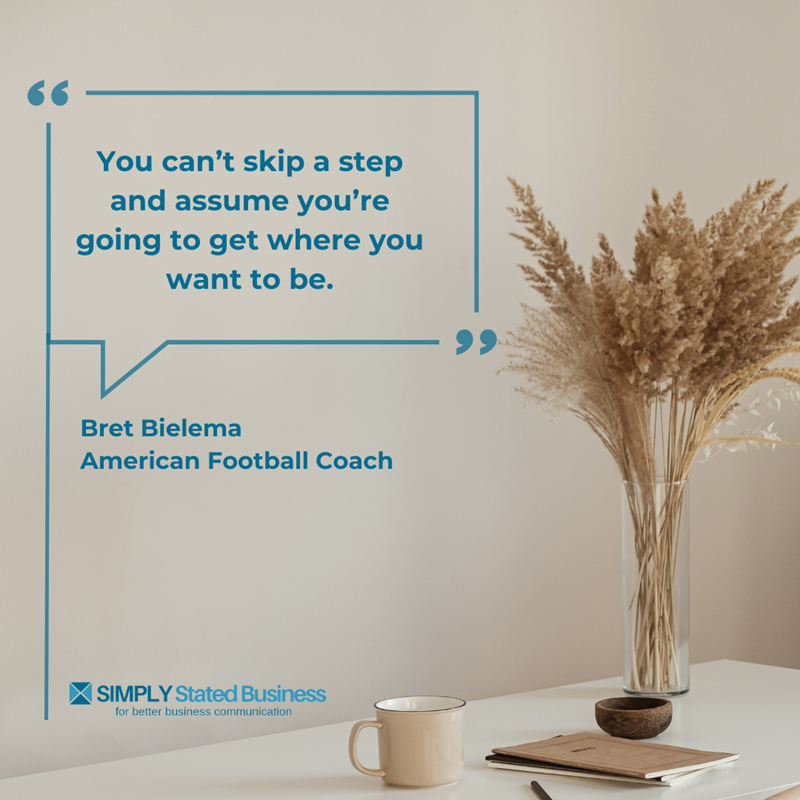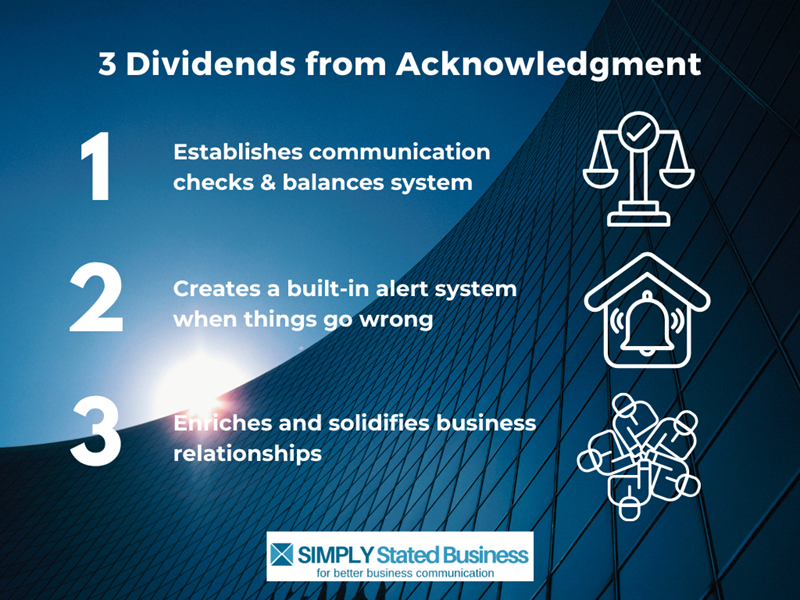
If you had a simple communication tip that would guarantee better business relationships, would you be interested? The best news is you don’t have to pay anything to get it.
What is this miracle solution?
Acknowledgment.
If you’re thinking – huh? – allow me to explain and suggest ideas to use this simple communication tip to your advantage.
Why is Acknowledgment Important?
If there are humans and technology, we will always have communication hiccups.
- Emails are misdirected.
- Voice mails are not picked up.
- Colleagues and clients miss meetings.
The reasons may be due to technology failures or human shortcomings. But the simple act of acknowledgment will help you improve the odds for better business communication.
I Hear You
See if the following example sounds familiar.
- You see an ad for a job that is a perfect fit.
- So, you complete the online application and attach your picture-perfect resume.
- Then you wait. And wait. And wait some more.
When you follow up, the company representative states they received your application, and someone will contact you soon.
Then you wait and wait some more. After calling again, you secure an interview. Yay! All goes well. The interviewer tells you they will be in touch. You know what happens next.
You wait.
You’re bummed. You really wanted that dream job, but you can’t wait indefinitely. You have bills to pay and a family to take care of.
So, you secure another job. Then the interviewer from your dream job calls to offer you the position. Both of you are disappointed when you feel compelled to decline the offer.
How would acknowledgment help this situation?
Let’s say the above scenario took 30 days to take place. If you have looked for work (particularly if you are unemployed at the time), 30 days is an eternity.
But, with a simple acknowledgment, the outcome could have been very different. Consider how acknowledgment has an impact on results.
- You complete the online application and attach your picture-perfect resume.
- Within 24 hours, you receive a thank-you and an acknowledgment of your application.
- The acknowledgment provides you with a timeframe for the review of applications and the first contact for interviews.
A company representative contacts you for an interview within the timeframe provided. The interviewer lets you know when you can expect a call back. There’s a hiccup along the way, delaying the process. However, you receive notification of the new timeframe.
The company calls and offers you the job! All within the same 30-day period. See the difference?
Acknowledgment minimizes the impact of inevitable problems that occur in business.
Acknowledgment Creates a Communication Alert System
You may be thinking, but what if you never receive an email or document? How can you acknowledge what you never receive?
Unless you are psychic, you can’t. But you can develop a pattern your clients and colleagues expect.
If you make a habit of acknowledgment, you activate your red flag warning system.
- The person contacting you anticipates an acknowledgment.
- A break in your pattern alerts them to a potential problem.
- The person contacts you for an update.

Assumption is not Acknowledgment
We all know what happens when you assume. Assuming certain acts will occur sets you up for failure. Let me give an example.
I contacted a physician’s office regarding scheduled surgery for my mom. The insurance plan required authorization for certain procedures.
- The staff member answering the call said she would check into it.
- She stated if I did not hear back, I could assume all was okay.
- Uh, no.
How do I know that staff member didn’t get busy and forgot to follow up? What would happen if the insurance company denied the procedure? (I know – never happens). Who do you think would be on the hook for the cost if the surgeon went ahead with the procedure?
Acknowledge and verify.
Avoid Communication Overload
Knowing when to acknowledge communication is as important as actually doing it. You can get too much of a good thing. Who hasn’t experienced the following exchange?
- A consultant sends a report and copies five team members.
- The recipient sends the message, “Thank-you” to the entire email distribution.
- The consultant hits Reply All and says, “You’re welcome.”
The recipient’s “thank you” is a simple, effective acknowledgment that notifies the sender you received the report. However, sending “you’re welcome” (particularly to the entire team) is overload. Even if your mother always told you to say, “You’re welcome.”
BONUS COMMUNICATION TIP: Never send a message that says, “Your welcome.” 😉
When to Respond
The following are suggestions for communication that benefit from acknowledgment.
- Upon receipt of requested information
- On communication requiring action
- If there is a delay in requests for action (e.g., you’re away from the office)

Communication Tip Dividends
Acknowledgment is a simple communication tip that delivers three high dividends.
#1 – Establishes a communication check and balance system for better service and support documentation.
#2 – Creates a built-in alert system to communication hiccups. When technology fails (and we know it will), the lack of acknowledgment alerts the sender there may be a problem.
#3 – Enriches and solidifies business relationships through acknowledgment. It shows you recognize and value business communication from colleagues, customers, and clients.
What other dividends do you see from acknowledging communication? Share your thoughts in Comments.
====================
Helping you Keep it simple, clear & uniquely yours
=====================
NOTE: This January 30, 2025 post updates the original that published on September 19, 2012 and was later updated on January 13, 2020.
And, yes, acknowledgment (or the lack thereof) still exists in today’s business communication .;-)

What a fantastic post! Sometimes it’s the smallest things that can make the biggest difference. I’m one of those “thank you” people. I always like to let people know when I’ve received something. If nothing else it builds up an audit trail of when things happened. And you’re right on – it also creates an alert system for when things fail.
On the other side of the coin, I’m also one of those annoying people who expects a response. If I send a question, meeting request or whatever and nobody acknowledges it, I start to nag… didja get it didja get it?? Because you’re right, you never know when something is missed.
Great advice!
Thanks, Carol Lynn. I appreciate those kind words. 🙂
I don’t find it annoying at all that you expect a response. It amazes me how few people acknowledge receipt of something they have been waiting for or requested. And you’re right, the smallest things really can make a difference.
Thanks for sharing your point of view, Carol Lynn.
I must admit too many of what I receive have been among those who need to be notified that they wore out “your welcome”
Leave it to you, Roy, to make me smile. Your comments are always welcomed. 😉
Good points and not everything needs to be acknowledged… when I send out my newsletter I get a handful of ‘I’ll be out of the office until…’ messages and I wonder if those do any good at all?
As someone who works a lot with corporate clients (and having been one for eons), I find the out-of-office notices very helpful. If you need an immediate answer, you know you have to go to another source.
Thanks for sharing your thoughts, Anne.